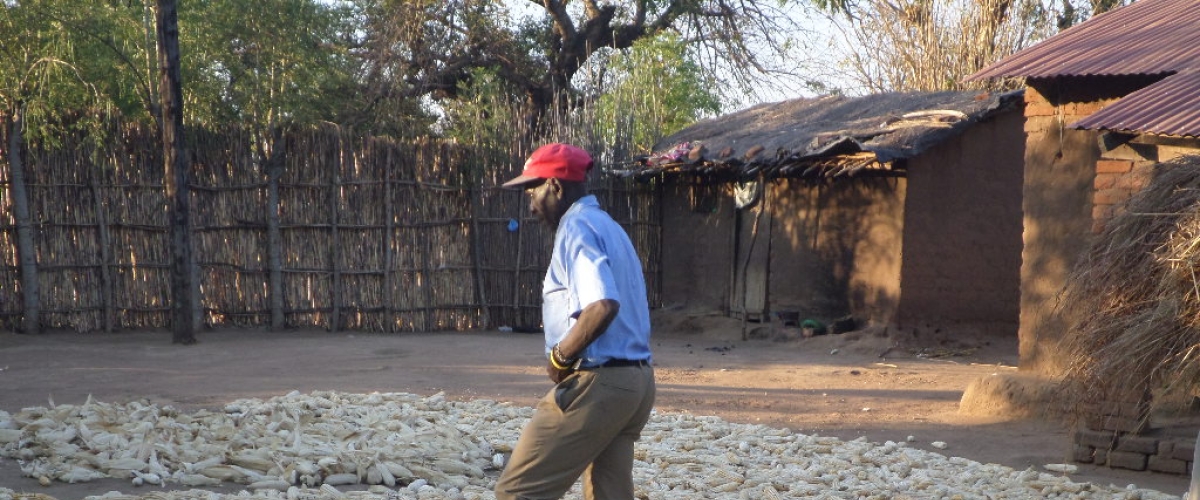
By Temwa Mhone
He is a delighted farmer of Chikalumpha Village Traditional Authority (T/A) Katunga in Chikwawa for achieving food security this year. This 68-year-old Andrek Biliati will enter the 2020/2021 growing season with eight bags and a granary full of maize. He is not worried about food. Biliati said two decades have passed since he registered such a food security feat for his seven-member family. He said: “All these years, from 2002, I sweated for less. My food production efforts were frustrated by environmental degradation. Effects of climate change like drought, dry spells and pests, and old farming methods made things worse.”
Environmental degradation makes the country vulnerable to drought, floods, dry spells, among other climate shocks, according to the Food and Agriculture Organisation of the United Nations (FAO). But the 2019/2020 plentiful harvest occurred amid the shoddier effects of climate change and hot weather conditions that clog food production efforts in the district. Biliati acknowledged his achievement to growing of climate adaptation maize varieties and use of irrigation farming. “I planted maize varieties that resisted drought and dry spells. They were disease and pest tolerant. They matured earlier and yielded highly, enabling me to harvest more maize. Irrigation has also been key to this success because we experienced a long dry spell,” he said. The varieties included MH54, MH52STR, MH55 and MH50STR, among others.
Another farmer in Mbenderana Village Traditional Authority (T/A) Kasisi Lovemore Tachokere said the crops are key to their food security. “We are resilient to climate change shocks. These varieties and irrigation farming have saved us,” he said. The crops these two farmers are touting are part of 14 maize crop varieties that the department of agricultural research services (DARS) released and promoted among farmers in the district through an Agricultural Productivity Program for Southern Africa (APPSA) project under Centre for Coordination of Agricultural Research and Development in Southern Africa (CCARDESA) with funds from World Bank. Through the project, DARS worked on the technologies to assist farmers to adapt to climate change and achieve food security.
Other crops included rice and bean, and local varieties of maize (nthikinya, kanjerenjere, kachiswe and chisowa), finger and pearl millets, bambala beans, and pigeon and cowpeas. Apart from food security, the program also promoted growing of Vitamin A bio-fortified maize varieties to improve nutritional statuses of the smallholder farmer households. The department released and disseminated five Vitamin A hybrids namely MH45A, MH46A, MH47A, MH48A and MH49A.
George Melo, a farmer in Fodya Village Traditional Authority (T/A) Ngabu, said growing of the crops has strengthened their nutrition education. “Apart from carbohydrates, these varieties are high in Vitamin A which is crucial for healthy living. I do cherish good health practices. The project helped me to diversify my food basket, too,” he said. With irrigation farming, he said he can grow crops any time of the year to maintain his food and nutrition security statuses.
APPSA project coordinator Dr Mackson Banda said smallholder farmers need such improved agriculture technologies and modern methods to thrive with farming despite effects of climate change. “We gave them updated varieties and technologies that are key in climate-smart agriculture. We have been active for a thorough address of smallholder farmers’ challenges caused by effects of climate change,” he said. The development and promotion of Vitamin A bio-fortified maize varieties team leader in Malawi Dr Kesbell Kaonga said farmers are aware of benefits of using the orange maize. “They do realise it is cheap to get Vitamin A from staple food than buying supplements. Because of high demand, this maize fetch good prices on markets and seven companies are ready for seed multiplication,” he said.
The author is Malawian- based media practitioner with passion in agriculture, development and environment






